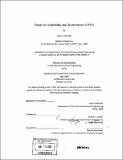Design for adaptability and deconstruction (DfAD)
Author(s)
Mouilek, Sabrina (Sabrina Marie)
DownloadFull printable version (36.63Mb)
Other Contributors
Massachusetts Institute of Technology. Dept. of Civil and Environmental Engineering.
Advisor
Jerome J. Connor.
Terms of use
Metadata
Show full item recordAbstract
Buildings are static elements in a dynamic environment characterized by fast changing needs and evolving environmental, social, and economic standards. Thus, today challenge for structural design through Design for Adaptability and Deconstruction (DfAD) is to create buildings that are flexible enough to answer these needs. This thesis analyses DfAD for building structures and presents three case studies: a tent, a structure with prefabricated panellised systems, and a container building. The key arguments that justify DfAD are the negative environmental impact of the current structures; the life cycle of a building; the changes expected from buildings; and the cost incentive of this design. DfAD is a combination of design approaches that deal with the different scales of a structure. The fundamental tools to achieve DfAD are the connections, the type of structure, and the use of prefabricated systems. This thesis shows that standardization and layer-and-module modelling are essential to achieve a sustainable structural design. Three case studies present the structural features and the applications of this design approach.
Description
Thesis (M. Eng.)--Massachusetts Institute of Technology, Dept. of Civil and Environmental Engineering, 2009. Includes bibliographical references (leaves 58-60).
Date issued
2009Department
Massachusetts Institute of Technology. Department of Civil and Environmental EngineeringPublisher
Massachusetts Institute of Technology
Keywords
Civil and Environmental Engineering.